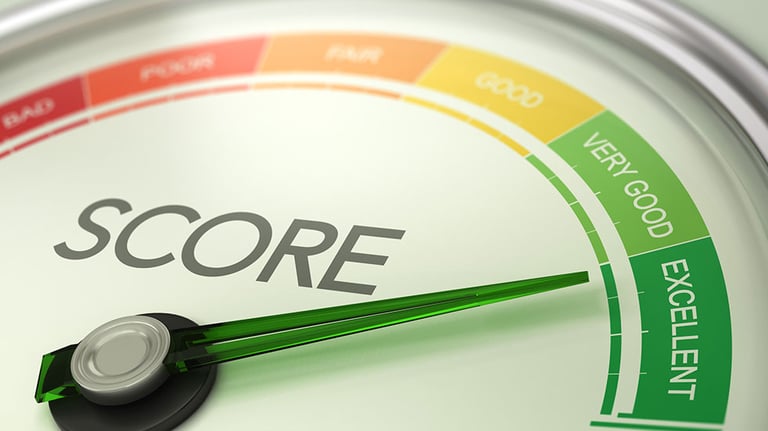You may have heard that credit is important. You may also have heard that it plays a big role in getting approved for a loan and ultimately receiving a favorable interest rate. This applies to two of the biggest purchases that people can make: houses and cars. If you’re wondering how much your credit score affects the car buying process, scroll on.

The perks of good credit
Most people choose to finance their vehicles, and a good credit score is key to securing a loan on favorable terms. Whether you’re working with the dealership, a bank, or a credit union, lenders will always factor your credit into the decision-making process. Ultimately, their goal is to evaluate your risk as a borrower using a universal standard.
The concept is simple. A higher credit score usually leads to a lower interest rate. It’s a simple concept that could help you save thousands over the total length of your loan. You’ll pay less for your car, and can generally expect a lower monthly payment, making it easier to pay off your vehicle faster.
If your credit score is too low, you may only qualify for loans with dramatically high interest rates. These are typically referred to as subprime loans. Even if you’re approved, you’ll end up paying much more than the sale price over the life of the loan. If possible, it’s best to steer clear of subprime loans, as they can be unsustainable if you fall behind on your monthly payments. Lenders who claim to help buyers with bad credit often specialize in subprime loans.
What credit score is needed to buy a car?
While it’s possible to get a loan with bad credit or even no credit, getting a desirable interest rate is a different story. To know where you stand, you can check your credit score, as reported by three major credit bureaus: TransUnion, Equifax, and Experian. Each one may produce a slightly different score, but the criteria are fundamentally similar.
Your credit score is sorted into one of several tiers, which can help inform the rate you’re eligible for. According to Experian, a score between 781-850 is considered super prime. This is the highest tier of credit, and applicants in this range usually qualify for the most compelling interest rates advertised. A score between 661-780 is considered prime and may qualify for rates that are higher but still competitive.
A credit score between 601-660 is categorized as near prime. Applicants in this tier may be approved for a loan but should expect even higher interest rates. Scores under 600 are considered subprime, with interest rates that are often several times more than those offered to buyers in preferred credit tiers.

Ways to increase your credit score
It takes time to build good credit. There are no shortcuts, but there are a few ways to keep your score trending upward. The first and most straightforward step is to ensure that your bills are paid on time. This includes student loans, auto loans, and credit cards. If you’re having trouble keeping track, setting up automatic payments may help ensure payments are made on time.
Lenders want to know that borrowers are able to pay off their debts and like to see a low credit utilization ratio. For most people, less than 30% is ideal, so, if you have multiple credit cards with a total credit limit of $10,000, your total monthly statement balance should be less than $3,000 to avoid hurting your credit score. The lower your credit utilization ratio, the more you can expect your score to benefit.
Some people cancel unused credit cards or find that they have been closed automatically. Your score benefits from having multiple lines of credit and a longer credit history, so it helps to keep your credit cards open. To prevent automatic account closures, simply make a small purchase on each card annually. If you can no longer pay an annual fee, call the issuer and ask about downgrading to a no-fee card.
Before you buy
Assuming you don’t need a car right away, it’s smart to check your credit before you start shopping. This helps inform which credit tier you fall into, and ultimately what kind of financing you may qualify for. Several major banks offer free credit score reporting, as well as sites like Credit Karma.
While you’re checking your score, it’s a good time to check your overall credit history and ensure there aren’t any reporting errors. This could include accounts from other people with similar names or missing information about existing accounts. If you find an error, be sure to notify the credit bureau as well as the company providing the information. The goal is to correct any and all errors before purchasing your car.
Try to avoid applying for credit cards, mortgages, or any other loan during this time. Most applications produce a hard credit inquiry, which can lower your score and remain on your report for two years. Excessive inquiries can be a red flag for lenders, so it may be beneficial to space out your applications as much as possible.

Getting the best financing terms
Regardless of what you’re shopping for, it always helps to have multiple options so you can choose the best one. That includes auto loans, specifically the interest rate and length. It can be useful to get a quote from a bank or credit union so you’re pre-qualified before you visit the dealership. This gives you a starting baseline to work with at the dealership, which may be able to beat that rate if you have an offer in hand.
If you don’t qualify for the financing you want, you may need to decrease the size of your loan. One option is to offer a bigger down payment, which is a good strategy for paying less interest. Try starting with 20% if possible. You can also choose a less expensive vehicle, which can be a similar model or an entirely different car.
Finally, timing is everything. Manufacturers offer special incentives throughout the year that can help buyers save thousands, including cashback and promotional APR. This includes special programs designed for students and the military.
This content was created in partnership with TrueCar.

